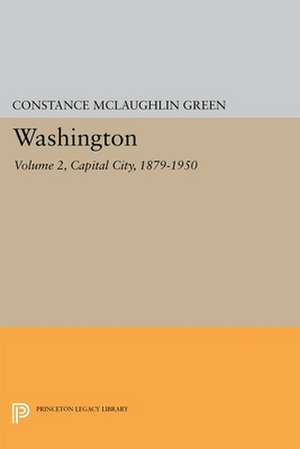Washington, Vol. 2 – Capital City, 1879–1950: Princeton Legacy Library
Autor Constance Mclau Greenen Limba Engleză Paperback – 11 feb 2016
| Toate formatele și edițiile | Preț | Express |
|---|---|---|
| Paperback (1) | 549.48 lei 6-8 săpt. | |
| Princeton University Press – 11 feb 2016 | 549.48 lei 6-8 săpt. | |
| Hardback (1) | 1440.48 lei 6-8 săpt. | |
| Princeton University Press – 18 apr 2016 | 1440.48 lei 6-8 săpt. |
Din seria Princeton Legacy Library
-
 Preț: 437.79 lei
Preț: 437.79 lei -
 Preț: 172.27 lei
Preț: 172.27 lei - 16%
 Preț: 683.62 lei
Preț: 683.62 lei - 16%
 Preț: 2324.07 lei
Preț: 2324.07 lei -
 Preț: 376.98 lei
Preț: 376.98 lei - 23%
 Preț: 780.24 lei
Preț: 780.24 lei -
 Preț: 377.30 lei
Preț: 377.30 lei -
 Preț: 313.18 lei
Preț: 313.18 lei - 16%
 Preț: 882.79 lei
Preț: 882.79 lei - 16%
 Preț: 736.39 lei
Preț: 736.39 lei - 16%
 Preț: 860.07 lei
Preț: 860.07 lei -
 Preț: 362.12 lei
Preț: 362.12 lei -
 Preț: 223.24 lei
Preț: 223.24 lei -
 Preț: 363.10 lei
Preț: 363.10 lei - 16%
 Preț: 915.46 lei
Preț: 915.46 lei -
 Preț: 340.21 lei
Preț: 340.21 lei - 16%
 Preț: 835.11 lei
Preț: 835.11 lei -
 Preț: 266.84 lei
Preț: 266.84 lei -
 Preț: 317.65 lei
Preț: 317.65 lei -
 Preț: 329.09 lei
Preț: 329.09 lei -
 Preț: 265.73 lei
Preț: 265.73 lei -
 Preț: 260.54 lei
Preț: 260.54 lei -
 Preț: 314.84 lei
Preț: 314.84 lei -
 Preț: 402.66 lei
Preț: 402.66 lei -
 Preț: 464.18 lei
Preț: 464.18 lei -
 Preț: 351.09 lei
Preț: 351.09 lei -
 Preț: 483.81 lei
Preț: 483.81 lei - 19%
 Preț: 500.29 lei
Preț: 500.29 lei -
 Preț: 388.44 lei
Preț: 388.44 lei -
 Preț: 328.48 lei
Preț: 328.48 lei - 23%
 Preț: 742.04 lei
Preț: 742.04 lei -
 Preț: 372.92 lei
Preț: 372.92 lei -
 Preț: 328.70 lei
Preț: 328.70 lei - 19%
 Preț: 505.89 lei
Preț: 505.89 lei -
 Preț: 446.25 lei
Preț: 446.25 lei -
 Preț: 289.17 lei
Preț: 289.17 lei - 19%
 Preț: 575.53 lei
Preț: 575.53 lei -
 Preț: 447.20 lei
Preț: 447.20 lei -
 Preț: 484.19 lei
Preț: 484.19 lei -
 Preț: 271.12 lei
Preț: 271.12 lei -
 Preț: 314.46 lei
Preț: 314.46 lei -
 Preț: 362.51 lei
Preț: 362.51 lei -
 Preț: 307.07 lei
Preț: 307.07 lei - 19%
 Preț: 498.46 lei
Preț: 498.46 lei -
 Preț: 272.27 lei
Preț: 272.27 lei - 19%
 Preț: 458.44 lei
Preț: 458.44 lei -
 Preț: 406.20 lei
Preț: 406.20 lei - 19%
 Preț: 515.73 lei
Preț: 515.73 lei -
 Preț: 428.88 lei
Preț: 428.88 lei -
 Preț: 369.27 lei
Preț: 369.27 lei
Preț: 549.48 lei
Preț vechi: 678.36 lei
-19% Nou
Puncte Express: 824
Preț estimativ în valută:
105.15€ • 109.12$ • 87.89£
105.15€ • 109.12$ • 87.89£
Carte tipărită la comandă
Livrare economică 17-31 martie
Preluare comenzi: 021 569.72.76
Specificații
ISBN-13: 9780691625133
ISBN-10: 0691625131
Pagini: 602
Dimensiuni: 159 x 233 x 33 mm
Greutate: 0.83 kg
Editura: Princeton University Press
Seria Princeton Legacy Library
ISBN-10: 0691625131
Pagini: 602
Dimensiuni: 159 x 233 x 33 mm
Greutate: 0.83 kg
Editura: Princeton University Press
Seria Princeton Legacy Library
Descriere
Descriere de la o altă ediție sau format:
In this second volume Constance Green describes the development of the local community, its citizens and institutions, through the years following World War II. Particularly interesting is the dominant role played by the Washington Negro community, which had early become the cultural center of American Negro society. The conflicts, ambitions, and a
In this second volume Constance Green describes the development of the local community, its citizens and institutions, through the years following World War II. Particularly interesting is the dominant role played by the Washington Negro community, which had early become the cultural center of American Negro society. The conflicts, ambitions, and a
